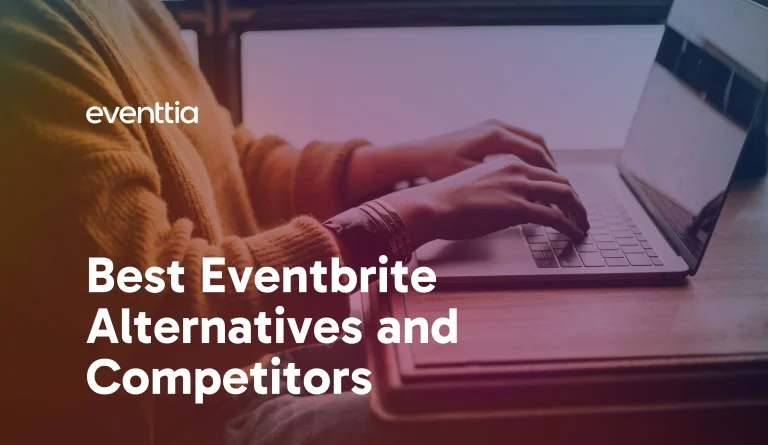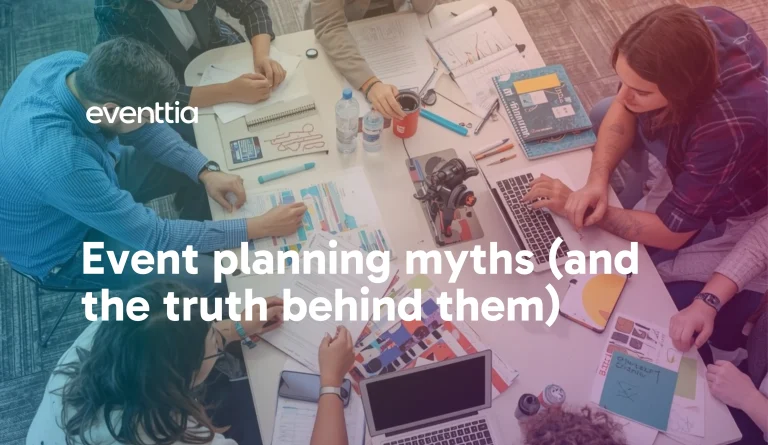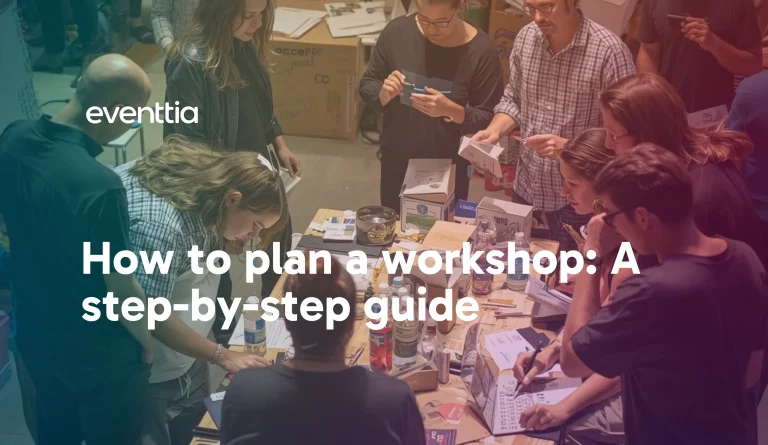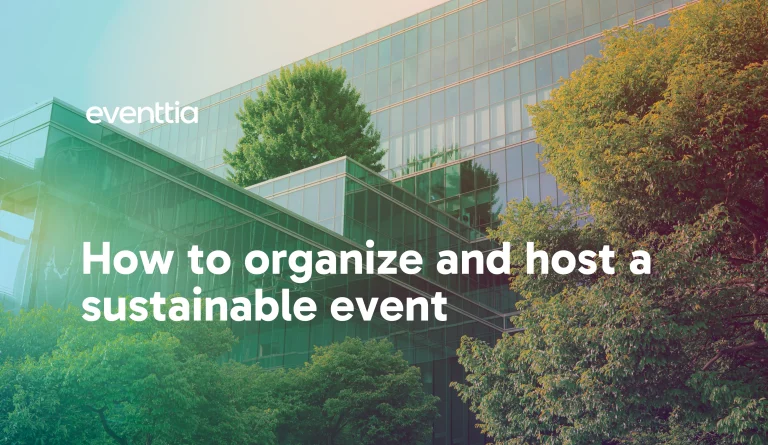Event Promotion Strategies: Quick Summary
Top event promotion strategies:
Create an event website: Build a branded, mobile-friendly site with compelling copy, speaker highlights, and a clear CTA. Use retargeting ads to capture visitors who don’t immediately register.
Leverage email marketing: Send branded, personalized invitations, follow-ups, and reminders. Use CRM data to segment audiences and boost conversions.
Promote on social media: Plan content calendars, use branded hashtags, tag speakers, post videos and teasers, and engage across platforms like LinkedIn, Instagram, and Facebook.
Use blogging & SEO: Publish detailed posts, invite guest contributors, and optimize for keywords so potential attendees find your event via search.
Partner with sponsors & influencers: Share ready-to-post promo kits, offer referral discounts, and leverage influencer credibility to expand reach.
Engage the press & media: Issue press releases, secure coverage, and share it widely. Add your event to industry directories for extra visibility.
Offer incentives: Early-bird discounts, giveaways, and exclusive offers drive urgency and encourage registrations.
There’s no point in organizing world-class events if you don’t promote them. To make sure participants attend, you need to target the right audience, drive registrations, and increase your reach to turn your events into successful ones. But how do you do this if it’s your first event, you don’t have a large audience, or your brand isn’t established yet?
To help you get started, we’ve put together a list of event promotion strategies and ideas. There’s something to suit every budget and event type, and many strategies can be combined to increase your reach even further.
Keep reading to discover the most effective ways to promote your events, and how Eventtia streamlines event marketing to boost your ticket sales and maximize attendance for your next events.
Event Promotion Strategies
There are lots of different ways to promote your event, from creating an event website to focusing on social media or sponsors and partnerships. Some companies prefer to focus their efforts on one promotion channel, while others prefer to try different strategies to find what works best for their audience.
Regardless of which marketing strategy (or strategies) you focus on, it’s a good time to explore AI solutions to make your event promotion faster and more effective. For example, AI can help you personalize event emails to participants, create social videos for a fraction of the traditional cost, or analyze attendee data to better target your marketing strategies.
Start With Your Event Website
A website for your event is a great place to start. It needs to be visually appealing, while also giving attendees all the information they need about your event, from dates to guest speakers.
With Eventtia, you can build beautiful, branded websites and event pages with a simple drag-and-drop editor. It’s easy to embed registration forms directly on the site (or even your existing web pages), boosting conversions and maximizing your guest list.
For example, let’s take a look at this branded event page Cartier made using Eventtia:
It starts with an eye-catching branded banner with the company’s logo, then leads off the details with a description of the event.. Scroll further down, and you’ll find all the details—the program, the speakers, and the main pratical information including photos and a Google Map to the event venue.. For advanced visual personalization, the French luxury brand used custom CSS directly within Eventtia’s website composer.
Let’s examine some of the most important factors to consider when creating your event’s website or branded event page.
1. Create Compelling Copy and Visual Identity
An event website is the main source of event info for attendees, such as the agenda, time, place, and most importantly, why they should attend. This is often the first glimpse potential attendees will have of your event, and as you know, first impressions are key.
Keep your event website precise and have a clear, compelling call to action. Think carefully about the language you use, just as you would for your company’s website or other landing pages. Visually, make sure your website is on-brand, clean, and eye-catching.
2. Make it Mobile-Friendly
Remember, many attendees will be viewing your website from mobile devices, so make sure your event page or website is responsive and visually appealing on smaller screens. If you have registration forms on your site, check that they can easily be completed from a mobile device.
3. Highlight Your Program and Speakers
Speakers sell tickets, so having them feature prominently on your website is important. Include names, headshots, logos, company info, and social profiles of your speakers. Make sure you also reserve a section of your site for the event program, so your participants know what to expect and why they should attend.
4. Keep it Simple
The aim of every event landing page is to convert website visitors into attendees. There’s only so much enticing you can do with copy and a well-designed webpage, so be sure to add plenty of buttons with a single, clear call to action.
5. Test and Optimize
Use data, analytics, and research to identify potential attendees’ interests and why they might want to attend an event like yours. Shifting to this mindset is the easiest way to convert website visitors into event ticket holders.
You might also like to create different versions of your event page or website and perform A/B testing. You can test different messaging, colors, design layouts, CTAs, and more. This will help you optimize your website for your current event, as well as future events you plan.
6. Use Ad Retargeting
Sometimes, people will visit your event website without completing the event registration. In this case, you can create retargeting ads with Google AdWords to remind them of your event as they’re on other websites. Retargeting ads are effective because you’re reaching a specific audience that’s already familiar with your event, resulting in higher conversions.
Event Promotion with Email: Best Practices
Emails are a great way to get the word out about your events. Use your mailing list and your network of partners and speakers to generate excitement around your event. Make sure your emails look like your brand and stick to the important stuff without writing too much.
The Future World Forum does this well in this example:
With Eventtia, you can build branded, personalized emails that are guaranteed to have guests registering for your event. Our seamless integration with CRM systems makes it easy to streamline communication, monitor audience engagement, and launch targeted marketing campaigns effortlessly.
Let’s take a look at some of the most important factors to keep in mind with email marketing. If you’re looking for more tips and inspiration, head to our guide on event invitation examples. It covers everything from proven subject lines to which details the body of your email needs to contain.
7. Speak to Your Audience
You can’t build a successful email campaign that attracts more attendees if you don’t know the needs and expectations of your audience. Focus on offering solutions to pain points, whether it’s the desire to earn more money, grow their businesses, or save time (depending on the type of your event), find something that defines your target group and build your email message around it.
8. Stay on Point
If you want to attract more attendees to your next event, keep your invitation emails simple, yet personal. Always address people by their names and try to keep your emails short and sweet. Focus on the most important details, and offer resources (like a link to your event website) where attendees can learn more.
9. HTML vs Text Emails: Pros and Cons
For event marketing, HTML emails give you more creative freedom. You can brand them, add interactive elements and visuals, and really make your CTA stand out. On the other hand, plain text emails are simpler, more readable, and less likely to end up in a spam folder, though not as eye-catching.
Email invitation powered by Eventtia
10. Follow Up (But Not Too Often)
If you want to attract more attendees, establish a follow-up system. Don’t get discouraged if people don’t register right away or respond to your first email. Most probably, they are just busy or didn’t truly understand the benefits of your event. After a few days, make sure to follow up and experiment with a different invitation message.
How to Promote Your Event with Social Media
Social media can be a powerful tool when it comes to event promotion. From leveraging the LinkedIn followers of your speakers and partners to promoting the event across your company’s own profiles, it’s a great way to boost engagement, interest, and excitement around your event.
Once you create an event page with Eventtia, you can promote it on your social channels, as Nike did here:
If you’re planning on promoting your event on social media, here are some tips to help you get started.
11. Build a Content Plan and Social Media Calendar
Create a social media calendar, where you plan ahead what you are going to post on which network. You should know WHY you are posting every single post. All of your posts should have a specific purpose, and you should measure the engagement of each type of post to identify what resonates best with your audience.
12. Research Your Hashtags
You can create a specific hashtag to use for your event, to make it easier for others to share event-related content on their own pages. As well as a branded hashtag, research popular hashtags to add to your event posts—the right hashtags can help your posts reach more potential attendees in the buildup to your event.
13. Tag Speakers in Posts
Expand your audience by tagging speakers and VIP guests in your social posts. This way, you’ll gain traction from their followers, getting more eyeballs on your event. Encourage speakers to share your event-related posts on their own profiles and pages, too.
14. Leverage Different Platforms
Make sure you leverage different social platforms. For example, Facebook and Instagram might be more effective for creating expectations and getting people excited about your event, whereas X and LinkedIn are great networks to share valuable content with your (potential) attendees.
15. Use Video
By far the most digestible format of content, video creates expectations and excitement around your event. Plus, it’s a great way to boost the engagement of your audience. Use your video to highlight the purpose and the event message you have defined. Keep in mind your audience and their needs, and make sure the video points out how the event can benefit them.
16. Create Teaser Posts and Build FOMO
Share pictures with your followers they don’t usually get to see. Include your potential attendees in the entire event experience from the planning and organizing through to behind-the-scenes pictures happening during the event. If it’s an annual event, share content from previous years in the build-up to the event, to add to the excitement and anticipation.
Using a Blog to Promote Your Event
Blogging on your site is an effective way to convert visitors into attendees, and it also gives you lots of extra content to share on social media. A blog post really lets you get into the details of your event, in a way that you can’t in an email or social post.
17. Tell Your Story in Detail
Remember all those details about your event you wanted to include in your marketing emails, but didn’t have the space? A blog post is your chance to explain everything about your event—its history and background, why it’s important to you and your company, and so on. You can create infographics (which can also be shared as social posts) to help attendees understand the story behind your event.
18. Invite Speakers to Write Guest Posts
If your event has a high-profile speaker, encourage them to write a guest post for your blog (or vice versa). This can be shared in social posts and emails, bringing in a wider audience and more anticipation for your event.
19. Make the Most of SEO (Search Engine Optimization)
Your blog isn’t just great for storytelling, you can also optimize event-related blog posts for SEO, to help potential attendees find information about your event when using Google. Make sure you’re using relevant keywords related to your event throughout the article, in both the headings and body of your blog post.
Event Promotion with Sponsorships and Partnerships
Working with partners and sponsors is a great way to boost exposure and leverage the networks that your partners have established to get the message out about your event. Find relevant sponsors and partners, but avoid working with direct competitors in your space.
Plus, an event software like Eventtia allows you to highlight and promote your sponsors at every touchpoint of your event—from registration and the event page to email marketing and the event app.
Here are our tips for making the most of event sponsors and partners.
20. Create Special Partner Promotions and Discounts
It’s important to incentivize partners and sponsors to promote your event, as it can really increase your exposure. Create a unique promo code for each partner and speaker—they can use this code when they promote the event, offering a discount to their network. Since the code is unique to that partner, you’ll know how effective each partner was at promoting your event. You can also consider paying partners a referral fee for each attendee they bring to your event.
21. Build a Kit for Sponsors and Partners
Make it easy for your partners and sponsors to share event-related content by building them a kit. Include branded materials like logos, specific messaging and copy they can use, and ready-to-post social media infographics. This helps you keep your event on brand, and also increases the chances of your sponsors and partners actively promoting your event.
22. Offer Early-Bird Discounts and Deals
Encourage attendees to register for your event right away with early-bird discounts and deals. Maybe offer a special gift (like a gift card or branded merchandise) that’s only available until a certain date. Your partners and sponsors can co-promote this deal, bringing in more early RSVPs and boosting your guest list.
23. Consider Influencer Marketing
When done right, influencer marketing can deliver a high ROI. Make sure you’re promoting your event with a relevant influencer, like an industry expert or thought leader in your space. If they have a loyal, engaged following, it can increase your brand awareness, event interest, and registrations.
How to Promote an Event with the Press
Reaching out to the press is another great way to generate interest around your event. A well-respected media outlet promoting or reporting on your event is great news for your brand, and can help you generate more registrations. Here’s how to do it.
24. Publish a Press Release
A well-written press release can ensure the media is aware of your event’s existence. The media in turn will pass the news to the public and preferably, your target attendees. This can be an effective and relatively cost-effective approach compared to other marketing tactics.
25. Share Press on Socials
Once you have a press release or any sort of media attention, make sure you share it across your social channels. Include links to press releases, interviews, and more, and always include a CTA where potential attendees can register for your event.
26. Create a Lead-Gen Webinar or Podcast
Gated content, which requires viewers to provide details like an email address to access, is a great way to reach potential attendees. For example, you could host a free webinar or live podcast, gathering the contact details of your audience in the meantime. You can then reach out to them with event-related info, informing them about your event and encouraging attendance.
27. Add Your Event to Events Lists or Directories
Many event providers and networks have lists of upcoming industry events, and adding your event to these lists can help you reach a new (but still highly relevant) audience. Also, as long as your event website is SEO-friendly (optimize your website metadata, headings, and images with event location and name), your event should be displayed in Google event lists.
Key Takeaways: Test, Track, and Analyze Event Promotion Strategies for Your Next Event
As you can see, you can approach event promotion from a lot of different angles. It’s important to find the event marketing strategies that work best for your event, by testing different promotions and ads and analyzing the results. Using this data-driven approach, you’ll soon optimize your event promotion, boosting your ROI and focusing on the strategies that work to lock in more attendees.
With Eventtia, your all-in-one event management software, promoting your event is quick and easy. Create branded, drag-and-drop websites or event pages and high-converting event emails to turn potential attendees into confirmed RSVPs.
Schedule a demo with an Eventtia expert today to discover personalized, proven solutions for promoting your next event.
Discover how Eventtia helps world-leading brands digitize and scale their events
Learn moreShare





